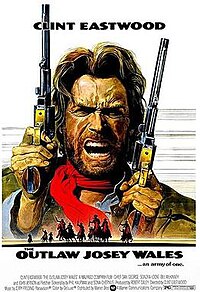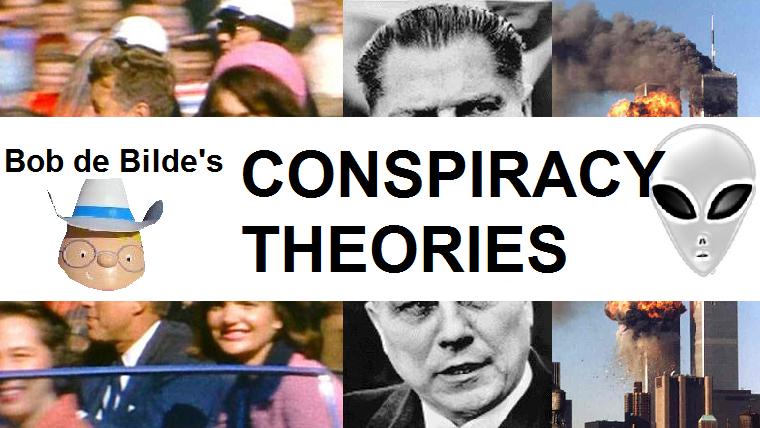 The Outlaw Josey Wales is a 1976 American revisionist Western set at the end of the American Civil War directed by and starring Clint Eastwood (as the eponymous Josey Wales), with Chief Dan George, Sondra Locke, Sam Bottoms, and Geraldine Keams.
The Outlaw Josey Wales is a 1976 American revisionist Western set at the end of the American Civil War directed by and starring Clint Eastwood (as the eponymous Josey Wales), with Chief Dan George, Sondra Locke, Sam Bottoms, and Geraldine Keams.The film was adapted by Sonia Chernus and Philip Kaufman from the novel The Rebel Outlaw: Josey Wales (republished in 1975 under the title Gone to Texas) by Forrest Carter. In 1996, the film was selected for preservation in the National Film Registry of the Library of Congress.
Clint Eastwood portrays Josey Wales, a peaceful Missouri farmer, who is driven to revenge by the brutal rape and murder of his wife and family by a band of pro-Union Jayhawkers—Senator James H. Lane's Redlegs from Kansas.
Wales joins a group of pro-Confederate Missouri guerrillas (bushwhackers or "border ruffians") led by William T. Anderson. At the conclusion of the war, Captain Fletcher (John Vernon) persuades the guerrillas to surrender, saying they have been granted amnesty. Josey Wales, still holding a grudge, refuses and witnesses the massacre of the men by Captain Terrill's (Bill McKinney) Redlegs, who've now joined the Union army.
Wales intervenes and guns down several Redlegs with a Gatling gun. Senator Lane puts up a $5,000 bounty on Wales. Wales begins a life on the run from Union militia and bounty hunters, while still seeking vengeance and a chance for a new beginning in Texas. Along the way, he unwillingly accumulates a diverse group of traveling companions, despite all indications that he would rather be left alone. His companions include an elderly Yankee woman from Kansas and her granddaughter rescued from a band of Comancheros, a wily old Cherokee named Lone Watie, and a young Navajo woman.
In the final showdown, Josey and his companions are cornered in a ranch house, which is fortified to withstand Indian raids. The Redlegs attack but are systematically gunned down or sent running by the defenders. Wales eventually runs out of ammunition and pursues the fleeing Captain Terrill on horseback. When he catches up to him, Josey confronts Terrill and dry fires his pistols through all twenty-four empty chambers before stabbing the captain with his own cavalry sword.
The ending scene shows two Texas Rangers and Fletcher appearing at the nearby town's bar. The locals tell them that Wales was gunned down. The Texas Rangers accept this and move on and Fletcher feigns ignorance, telling Wales that he will give him the first move as, he "owes him that." Wales rides off into the sunset.
- Clint Eastwood as Josey Wales
- Chief Dan George as Lone Watie
- Sondra Locke as Laura Lee
- Bill McKinney as Terrill
- John Vernon as Fletcher
- Paula Trueman as Grandma Sarah
- Sam Bottoms as Jamie
- Geraldine Keams as Little Moonlight
- Woodrow Parfrey as Carpetbagger
- Joyce Jameson as Rose
- Sheb Wooley as Travis Cobb
- Royal Dano as Ten Spot
- Matt Clark as Kelly
- Will Sampson as Ten Bears
- John Quade as Comanchero Leader
- Kyle Eastwood as Josey's son
The Outlaw Josey Wales was nominated for the Academy Award for Original Music Score. In 1996, this film was deemed "culturally, historically, or aesthetically significant" by the United States Library of Congress and selected for preservation in their National Film Registry. It was also one of the few Western films to receive critical and commercial success in the 1970s at a time when the Western was thought to be dying as a major genre in Hollywood.
The film is considered a Revisionist Western because the lead character and hero is an outlaw and parts of the Union Cavalry (and therefore the United States) are shown in a negative light. Such a depiction of U.S. Cavalry ran counter to traditional Westerns preceding it.
Clint Eastwood says on the 1999 DVD release that the movie is "certainly one of the high points of my career... in the Western genre of filmmaking."
The film is the source of the Directors Guild of America's so-called "Eastwood Rule." After Eastwood replaced director Philip Kaufman, the DGA instituted a ban on any current cast or crew replacing the director of a film.
The film was based on a novel by Forrest Carter. After the film's release it was revealed that Forrest Carter was in fact Asa Carter, a former Ku Klux Klan member and speechwriter for politician George Wallace. Eastwood and others involved in the production were reportedly unaware of this connection at the time the film was made. A major theme of the film is about Native Americans and Caucasians learning to live together peacefully. The Chief Dan George character makes pointed references to injustices done to his people by white Americans, especially the Trail of Tears.
Reception
The Outlaw Josey Wales has received overwhelmingly positive reviews, and currently holds a 97% on Rotten Tomatoes, with only one negative review out of several. Roger Ebert gave the movie a three out of four stars.
Historical basis
Josey Wales' circumstances somewhat mirror those of a notorious bushwhacker named Bill Wilson, a folk hero in Phelps and Maries counties in Missouri. During the war, loyalties in Missouri were divided. Bill Wilson maintained a neutral stance until a confrontation with Union soldiers on his farm on Corn Creek near Edgar Springs, Missouri. Wilson became a wanted outlaw before leaving for Texas.
The character Fletcher is loosely based on Capt. Dave Poole, one of Quantrill's Raiders. After the war, Poole assisted Federal authorities in convincing guerrillas to give up the fight and surrender.
This film is the first to confront the history of the Missourians who fell prey to Kansas-based Unionists who called themselves Redlegs (after their red-striped stockings and gaiters) and Jayhawkers. It is a revisionist film in that it abandons the standard presentations of the Unionists that characterized Hollywood productions up to that time, along with the dark depictions of the Missouri riders. The Outlaw Josey Wales reverses these stereotypes.














































No comments:
Post a Comment